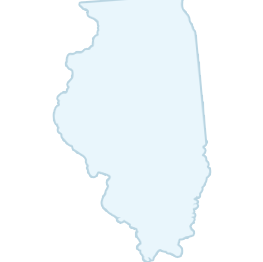Key Takeaways
- You are eligible for Medicare in Illinois at age 65. You may be eligible earlier if you have disabilities or certain diseases.
- To sign up for Medicare, the Initial Enrollment Period is three months before the month you turn 65, the month you turn 65, and the three months after your birth month. If you miss this window, you can enroll during the General Enrollment Period from January 1 – March 31.
- There are various assistance programs if you need help with healthcare costs, including the Medicare Savings ProgramMedicare Savings Programs help those with low incomes pay premiums and sometimes coinsurance for Medicare expenses. , Medicare Extra HelpExtra Help is a financial assistance program that helps people with low incomes pay for Medicare Part D coverage. and Programs for All-Inclusive Care for the Elderly (PACE).
Medicare eligibility in Illinois and across the nation begins at 65. People that receive SSDI or Railroad Retirement Board benefits may be eligible before 65. Living with end stage renal disease or ALS may also make a person qualified under 65. Although Medicare is not free insurance in IL, it is worth comparing plans to find the coverage you need at an affordable cost. GoHealth agents are licensed in IL and can help you better understand your options.
If you’re wondering what you need to know about Medicare, you’re not alone. When the time comes to enroll in Medicare, you have several choices to make. At the most basic level, how do you enroll in Medicare? Or how does Medicare work? We will answer these questions and more as we take you through the basic elements of Medicare in IL, and how they work for your situation.
Who Is Eligible for Medicare in Illinois?
You are eligible for Medicare in Illinois if you are ages 65 and older and a U.S. citizen or a permanent legal resident who has lived in the U.S. for more than five years. Younger Americans under 65 and/or living with disabilities and receiving Social Security can be eligible. Additionally, those living with End Stage Renal Disease (permanent kidney failure requiring dialysis or transplant) are also eligible before 65.
Note: If you have Lou Gehrig’s disease (ALS), you can qualify to receive Medicare.
Find the Medicare Advantage plan that meets your needs.
How Do I Apply for Medicare In Illinois?
Suppose you live in Illinois and are already receiving Social Security or Railroad Retirement Board (RRB) benefits. In that case, you are typically automatically enrolled in Medicare Part A and Part B. If this is the case, you will receive instructions during the Initial Enrollment Period from the Social Security Administration. However, if you are not receiving Social Security, you can find enrollment dates for Medicare below.
Enrolling in Medicare in IL
If you are eligible for Medicare in Illinois, you can enroll in several different Medicare plans, depending on your personal needs. You can enroll during the Initial Enrollment Period or the General Enrollment Period.
Initial Enrollment Period
- The Initial Enrollment Period (IEP) occurs from three months before the month you turn 65, the month you turn 65, and the three months after your birth month. Your IEP is a seven-month window. However, if you miss this window, you can enroll during the General Enrollment Period from January 1 through March 31 each year.
Medicare Part C & D Annual Enrollment Period
- You can enroll in a Medicare Advantage or Part D plan during the Annual Enrollment Period from Oct. 15 to Dec. 7.
- You can enroll in Medicare if you miss the Initial Enrollment Period by signing up during the Medicare General Enrollment Period. Medicare’s General Enrollment Period, no matter which state you live in, takes place from January 1 to March 31. If you enroll during this period, your coverage will start on July 1.
- The Medicare Advantage Open Enrollment Period runs from January 1 to March 31 every year. You have the option to switch to another Medicare Advantage plan with or without drug coverage. Also, you have the option to switch back to Original Medicare and enroll in a drug plan (Part D) if you choose.
What Does Medicare Cover in Illinois?
If you are eligible for Medicare and living in Illinois, you have several options for coverage. Below are the options that are available to you.
Original Medicare (Part A and Part B)
Below is a summary of what is covered by Original Medicare’s Part A and Part B.
- Part A: Medicare Part A, also known as Hospital Insurance, is often provided at no cost for participants with enough earned credits based on their work history or a spouse who is at least 62 years of age. You are not required to pay a monthly premium for Medicare Part A if you or your spouse has worked 10 years while paying Medicare taxes.
- Part B: Medicare Part B covers medical services and has a monthly premium. In some cases you can delay Part B enrollment, but anyone that neglects enrollment during an eligible enrollment period will be required to pay late penalties if they choose to enroll later.
Medicare Advantage (Part C)
- Part C: Medicare Advantage (Part C) replaces Original Medicare (Part A & B), but offers the same Part A and B benefits or coverage as Original Medicare. Along with receiving Part A and B benefits, Medicare Part C often bundles additional services like dental, hearing, vision and prescription drug coverage.
Additional coverage for Medicare
Besides Original Medicare and Medicare Advantage, there are additional coverage options that fall under Medicare. These options include Medicare Part D and Medigap.
Medicare Part D (Prescription Drug Plan)
Medicare Part D, also known as Prescription Drug Insurance, is not required for plan participants enrolled in any of the state programs (such as CIP, TRIP, LGHP or State). This coverage does have a monthly premium. Assistance programs like Extra Help may cover some or all of your Part D premium.
Medicare Supplement (Medigap)
Medigap is a Medicare Supplement insurance. The purpose of Medigap is to help with your Part A and Part B out-of-pocket costs, including deductibles and copayments. Medigap plans are offered by private insurance companies, but you are not able to choose a Medigap plan if you have a Medicare Advantage plan.
Assistance Programs
If you are worried about affording any costs associated with a Medicare plan, there are a few assistance programs that can help. These include the Medicare Savings Program, Medicare Extra Help and Programs for All-Inclusive Care for the Elderly (PACE).
Medicare Savings Program
Medicare Savings Programs help Medicare-eligible individuals who are not able to pay the out-of-pocket expenses that Medicare does not cover. Anyone in Illinois can apply for these programs. However, most programs are designed to help people with Medicare who have lower incomes or certain disabilities.
Medicare Extra Help
The Medicare Part D Extra Help program, also known as Medicare Extra Help, is a program that assists people with limited income and resources to pay for prescription drugs. This program might lower your premiums and copays or insurance. It can also cover you throughout the coverage gap and waives any Part D late enrollment penalty.
Programs for All-Inclusive Care for the Elderly (PACE)
Programs for All-Inclusive Care for the Elderly, or PACE, is a program that provides comprehensive medical and social services to certain elderly people who are still living in the community. Most participants are dually eligible for both Medicare and Medicaid.
My Medicare coverage doesn’t address all of my needs.
How Much Is Medicare in Illinois?
Although you typically need to pay a premium for Medicare Part B, many people are eligible for Part A without a premium. If you (or your spouse) have worked at least ten years while paying Medicare taxes, you are not required to pay a monthly premium for Medicare Part A.
Additionally, there are other costs involved in Original Medicare (Part A and Part B), including deductibles, copayments and coinsurance. Original Medicare does not include prescription coverage (unless you are in the hospital, or have medications administered to you in a doctor’s office).
Thousands of older adults enroll in Medicare every day across the United States. The latest CMS data shows that 2,116,359 people are enrolled in Medicare Part A and B in Illinois. The total number of beneficiaries enrolled in Medicare Advantage increased from 651,686 to 725,503 year over year. Medicare Advantage participation in Illinois went from 31.35% to 34.28% year over year. If you’d like to dive deeper into how Medicare in Illinois breaks down across the state, we provide a glance at who is using Medicare and how.

2,116,359 Beneficiaries with Part A & Part B
725,503 Medicare Advantage Beneficiaries
34.28% Medicare Advantage Participation Rate
55.32% Female
44.68% Male
80.04% Non-Hispanic White
9.32% African American
5.58% Hispanic
5.06% Other/Unknown
16.90% Eligible for Medicaid
1.01 Average HCC Score
$10,903.22 Actual Per Capita Costs
19.17% Hospital Readmission Rate
27.85% % of Beneficiaries with an Emergency Department Visit
651,686 Medicare Advantage Beneficiaries, Previous Year
Increased Medicare Advantage, Year over year
31.35% Medicare Advantage Participation Rate, Previous Year
Table reflects the latest Beneficiary Demographics Data: Medicare Geographic Variation – by National, State & County
Average HCC Score: The Hierarchical Condition Category score gauges a population’s overall health. The score is based on a value of 1.0. Populations with an HCC score of less than 1.0 are considered relatively healthy. The score can be used to estimate health costs.
My Medicare coverage doesn’t address all of my needs.
Illinois Department of Insurance
https://idoi.illinois.gov/
What should I know about the Illinois Department of Insurance?
The Illinois Department of Insurance educates and protects consumers while regulating the state’s insurance market.
Illinois Department of Healthcare and Family Services
https://hfs.illinois.gov/
What should I know about Illinois DHFS?
If the cost of health coverage is a problem or you have questions about Medicaid eligibility or existing benefits, contact DHFS.
Illinois Department of Human Services
1-866-324-5553 (TTY)
https://www.dhs.state.il.us/
What should I know about the Illinois DHS?
If you have questions about an open case, benefits, health services, or eligibility, contact the DHS.
Illinois Department of Veterans’ Affairs
1-(312)-814-2764 (Chicago)
https://veterans.illinois.gov
What should I know about the IDVA?
The IDVA is not responsible for your federal benefits. IDVA employees are highly knowledgeable with federal benefits and regularly assist Illinois veterans in applying for their federal VA benefits and providing assistance.
Nationwide Resources
Speak with a GoHealth insurance agent that is licensed in Illinois about your Medicare questions.
Mon – Fri, 8 a.m. – 6 p.m. CT
Centers for Medicare and Medicaid Services
You can reach the Social Security Administration by phone for general questions. Not all questions can be answered over the phone.
Also, SSA.gov provides online resources for the following: Review information, apply for benefits, or manage your account online
1-800-722-1213
TTY 1-800-325-0778
Speak to SSA Representative, Monday – Friday, 8 AM – 7 PM ET
Medicare Learning Guides
Healthcare is personal. So is choosing insurance. If you are new to Medicare, a beneficiary researching options, or a caregiver, we have tailored Medicare Guides for you.

Before 65 Guide
Understanding health insurance before age 65, especially when considering early retirement

Medicare Plans Guide
Costs, coverage and enrollment details for each Medicare plan

Medicare Beneficiary Guide
For those currently enrolled in Medicare

Low Income and Medicare Guide
For individuals with a qualifying income status

A Caregiver's Guide
For individuals with a qualifying income status
Sources
- Programs of All-Inclusive Care for the Elderly Benefits. Medicare.gov.
This website is operated by GoHealth, LLC., a licensed health insurance company. The website and its contents are for informational and educational purposes; helping people understand Medicare in a simple way. The purpose of this website is the solicitation of insurance. Contact will be made by a licensed insurance agent/producer or insurance company. Medicare Supplement insurance plans are not connected with or endorsed by the U.S. government or the federal Medicare program. Our mission is to help every American get better health insurance and save money.
Any information we provide is limited to those plans we do offer in your area. Please contact Medicare.gov or 1-800-MEDICARE to get information on all of your options.


